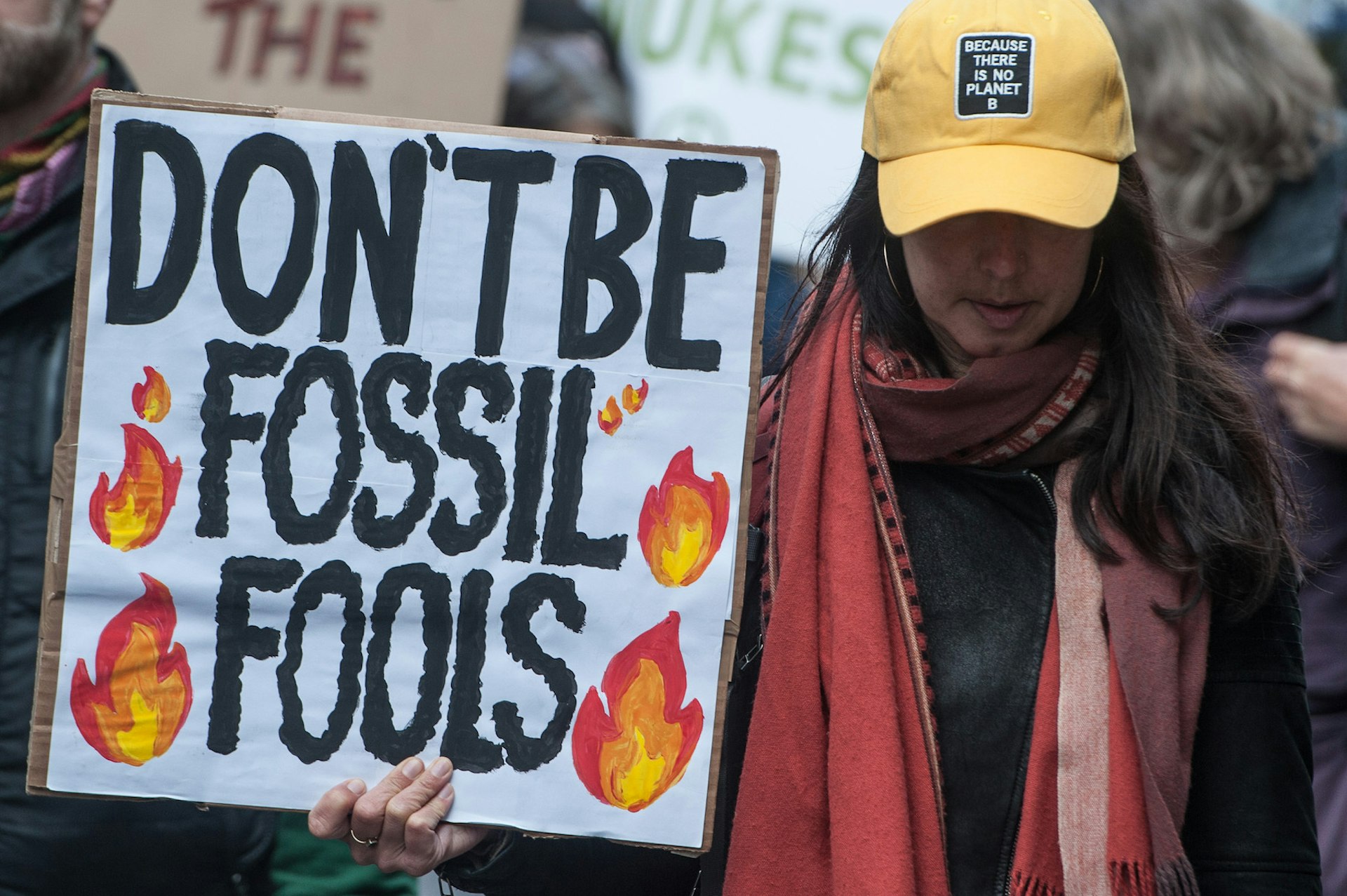
‘Net zero’ is not enough – we must end fossil fuels
- Text by Holly Jean Buck
- Photography by Guy Smallman
This is not going to be the decade in which we solve climate change. It is going to take longer than that. But it is still an absolutely critical decade. The 2020s can be the decade in which we build the capacity to get a plan together. In this decade, we can change our understanding of the problem and the work and build a new language. We can build the political power to confront this crisis for real.
We can let up on the “net-zero” talk, while specifying that we need an almost-zero version of net zero. We can focus on what to do with the fossil fuel industry, beginning with the steps laid out here: more bans on exploration and extraction, reform of inefficient fossil-fuel subsidies, expanding international coalitions and networks to develop a global approach, planning the retirement of infrastructure, piece by piece.
By the end of the decade, permission to extract, nationalisation in order to put fossil fuel companies under public control and wind down production, and reverse engineering the oil industry, as well as replacing petrochemicals with recycled hydrocarbons and biological products to fully end extraction, could all be understood as real options – if we build the right coalitions.
The real poverty of net zero, as a language and problem framing, is that it strips out the broader socio-ecological crisis from focus. There’s a growing understanding that the challenges we face lie inside the settler-colonial heart and mind. Technical approaches might reduce climate risks, but they won’t heal the underlying rifts, the exploitation of nature and one another. All this decarbonisation stuff can do is give us time to do the deep work.
Everyone can participate in phaseout of fossil fuels, because the work here is largely cultural, empathetic, and relational. It includes listening and creating new stories about retreat and ending and change. We already largely know how to execute a controlled demolition of fossil fuels, from a technical standpoint. There will be more roadmaps published; more scenarios, projections, and Geographic Information System analyses drawn up; more report launches and webinars. What we have to do is continue to make winding down fossil fuels mainstream common sense – but not just among technocrats and the policy elite. We have to also help one another understand it as an opportunity.
In my new book, Ending Fossil Fuels, I outline five main ideas to discuss with families, friends, and colleagues.
‘Net zero’ shifts the focus away from production
There are different versions of net zero. A language that can distinguish desirable versions from undesirable ones hasn’t yet evolved. There is in fact an elegant balancing capacity to the net zero concept, and given that the capacity to decarbonise is different in different places, it could potentially be an instrument to allow some places more time to transition: removing carbon in the atmosphere in one place can mean that another place can continue to produce fertiliser and feed people.
However, net zero is not enough. Without a plan for managing the decline of fossil fuels, net-zero talk and nascent carbon removal techniques are likely to be a discursive strategy for companies and countries to continue producing large amounts of fossil fuels. Net zero on its own is the wrong target of climate action. Curbing production and climate justice are both better goals.
How social media platforms work is a climate issue
The danger of mistaking discourse for reality is real – with regards to net zero, but everything else in our society too. The political economy of the social media ecosystem makes us vulnerable to collective delusions. Platforms like Facebook and YouTube profit from the polarisation of society, as their algorithms have figured out that we spend more time on their sites if we are fed polarising content. Having the energy-transition mediated by these platforms — in terms of us learning about and discussing what needs to be done — also means that there are limits to the bottom-up delegitimisation of fossil fuels. To address this, we need to be savvier about how we engage with these platforms.
We also need to break up the technology industry and put it under public control, treating it as valuable public infrastructure. This isn’t a “tech” issue; both democracy and the climate are at stake.
Strategising one step ahead of fossil fuel interests
Climate advocates need to be thinking in an anticipatory mode to guide both the phaseout of fossil fuels and the construction of the new clean energy infrastructure we need through the tough parts of the 2020s. This includes preparing for a coming disenchantment with renewables as well as the arrival of low-carbon fossil fuels. A political strategy that fails to acknowledge the real-world challenges with scaling up renewables or the appeal of low-carbon fossil fuels will not work.
In other words, we need to work to cite renewable projects in conversation with rural communities and make sure they see benefits from these projects; and rather than dismiss lower-carbon fossil fuels as an industry talking point, we need to take the prospect seriously and think about how that changes our arguments for phaseout. The climate politics of the 2020s need to be in dialogue with rural areas, and they need to centre health, centre workers, and identify the ways in which fossil fuel phaseout and new industries can provide new choices for communities.
Facing the challenges of phaseout head-on
There are real tradeoffs to ending fossil fuels, but the reasons to end them are stronger, and more progress can be made toward a near-zero world when working through the tradeoffs. Fossil fuels kill people, they stifle innovation, and they con- tribute to corruption and oppression. If a majority of people in a place want to continue fossil fuels, is ending fossil fuels compatible with democracy? If fossil fuel production under- lies social stability in a region, does ending fossil fuels risk conflict? An honest discussion acknowledges these challenges and tradeoffs head-on. The case for ending fossil fuels is strong enough to go there.
Phaseout needs to be approached in a multidimensional way
It requires deep cultural transformation. It requires both considering infrastructure from both place-based perspectives and global perspectives. Phasing out fossil fuels requires a democratic planning capacity, and, in developing it, we can also develop the planning and political power to phase out other things that kill or harm people and ecosystems. We will need that capacity to make it through this century and beyond. The ability to end things is emancipatory.
Why Net Zero is Not Enough is out now on Verso Books.
COP26 takes place between 31 October – 12 November 2021. Keep an eye on Huck’s live coverage of COP on our Twitter and Instagram, and read more about our climate takeover here.
